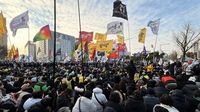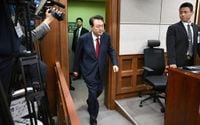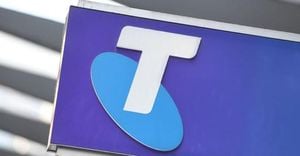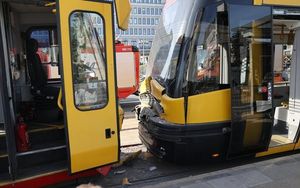As South Korea gears up for a crucial presidential election on June 3, 2025, the political landscape is rife with tension and uncertainty. The People Power Party (PPP) has narrowed its candidates down to Kim Moon-soo and Han Dong-hoon, both of whom have advanced to the final round of the party's second primary. This outcome was determined by an equal weighting of 50 percent of party member votes and 50 percent from a national public opinion survey. Kim has positioned himself as a critic of former President Yoon Suk Yeol’s impeachment, while Han has supported it, marking a significant ideological divide within the party.
Upon their advancement, Kim pledged, "I will work to help Korea overcome its crisis and become a great nation once again," whereas Han remarked, "The people may criticize the martial law declaration, but they will judge wisely when thinking of Korea’s future." The PPP is under immense pressure to present a united front and a clear vision for the future, especially in light of the recent political turmoil surrounding Yoon's impeachment following a controversial declaration of martial law on December 3, 2024.
The PPP's candidate will be officially announced on June 3, coinciding with the presidential election. However, the party faces significant hurdles, not least of which is public skepticism regarding their ability to move past the fallout from Yoon's controversial presidency. Many candidates in the primary have failed to offer genuine apologies for the political chaos, with debates often devolving into petty squabbles rather than substantive discussions about policy. If the final debate reflects this lack of seriousness, it could deepen public disappointment and further alienate voters.
In parallel, the Democratic Party (DP) is positioning itself strongly in the lead-up to the election. With Lee Jae-myung emerging as the clear frontrunner, having secured an overwhelming 89.77 percent of votes in the DP primary, the party is poised to capitalize on the PPP's internal strife. Lee's victory in the primary came just as the Supreme Court prepares to rule on an election law violation case against him, which has been a significant legal hurdle. The ruling is expected on May 1, 2025, just days before the presidential election.
Lee's campaign has focused on economic recovery and a willingness to engage in dialogue with North Korea, positioning him as a moderate voice in a polarized political environment. However, his ascent is shadowed by the Democratic Party's past failures to enact meaningful reforms during Moon Jae-in's presidency, where unmet promises led to widespread disillusionment among voters. The Democratic Party is also grappling with the legacy of its past, having once been the party of reform but now perceived as being captured by elite interests.
In a striking parallel to current events, the recent impeachment of Yoon has drawn comparisons to the earlier impeachment of former President Park Geun-hye, highlighting a cyclical pattern of political upheaval in South Korea. With the country still reeling from the ramifications of Yoon's presidency, there is a palpable fear among citizens that unless the political landscape shifts significantly, they may find themselves trapped in a repetitive cycle of impeachment and disillusionment.
Adding to the complexity, the PPP's leadership is also distracted by speculation surrounding Acting President Han Duck-soo’s potential candidacy, which could further complicate the party's strategy. As the election approaches, public opinion polls indicate that Lee Jae-myung maintains a significant lead, raising questions about the viability of the PPP's campaign.
Meanwhile, the political fallout from Yoon's administration continues to unfold. On April 30, 2025, prosecutors raided Yoon's home as part of an investigation into allegations of influence-peddling involving a shaman accused of receiving lavish gifts intended for the former first lady, Kim Keon Hee. This scandal has further tarnished Yoon's already low approval ratings and contributed to the PPP's struggles in the wake of the general elections last April, where they failed to regain a parliamentary majority.
Yoon’s impeachment has not only reshaped the political landscape but has also opened up discussions about the need for systemic changes in South Korea’s democracy. Advocates for expanded participatory democracy are calling for mechanisms that would allow citizens to recall elected officials and propose their own laws, arguing that such changes are essential to prevent future political crises.
As the June election draws near, both the PPP and the DP must confront the pressing issues of public trust and accountability. The candidates must articulate clear policies that resonate with voters, rather than merely criticizing their opponents. The outcome of this election will likely hinge on their ability to address the deep-seated grievances that have fueled public frustration and political instability.
In conclusion, the upcoming presidential election in South Korea is not merely a contest between candidates but a pivotal moment for the country's democracy. With the stakes higher than ever, voters are looking for leaders who can transcend the political chaos of recent years and offer a genuine path forward.





